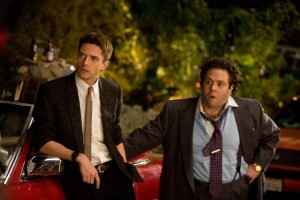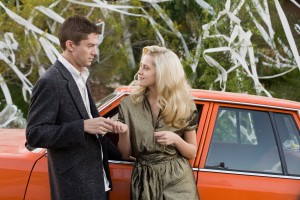Take Me Home Tonight
 Of the many funny things that comedian Faizon Love said during his frequent guest spots on Dinner For Five, regarding a film he co-starred in, Torque, one of the most perceptive was how the producers were far more worried about assembling the soundtrack rather than the screenplay. It’s a common downside to having to sell everything in your movie to even make a profit, from worrying about product placement, selling foreign rights, making deals on video-on-demand, etc., that assembling a soundtrack of recognizable music is of utmost importance, certainly more important than the actual film you’re making. We’re obviously not talking about art at this point, but the stench of being sold a product instead of even the bare minimum of entertainment is constantly filling the screening room.
Of the many funny things that comedian Faizon Love said during his frequent guest spots on Dinner For Five, regarding a film he co-starred in, Torque, one of the most perceptive was how the producers were far more worried about assembling the soundtrack rather than the screenplay. It’s a common downside to having to sell everything in your movie to even make a profit, from worrying about product placement, selling foreign rights, making deals on video-on-demand, etc., that assembling a soundtrack of recognizable music is of utmost importance, certainly more important than the actual film you’re making. We’re obviously not talking about art at this point, but the stench of being sold a product instead of even the bare minimum of entertainment is constantly filling the screening room.
Michael Dowse’s Take Me Home Tonight, already in trouble from having been on the shelf for four years, banks on our affection for 1980s pop music by piling on every single track familiar to those who like to watch late night infomercials for Time/Life CD compilations. It’s not that there’s an issue with using period music, it’s that the movie is just one long musical montage that occasionally gets interrupted by its characters experiencing an all-night party and the consequences from said activities. And it’s not as if this movie had any specific reason to take place in the late 1980s, other than as an excuse to include everything from “Come on Eileen” to “Straight Outta Compton” on the soundtrack*. The latter song is used for its main characters, star/producer/writer Topher Grace and Dan Fogler (as a manic car dealer, giving another John Belushi-lite performance,) to sing along to in a stolen car, because if there’s anything funnier than dorky white guys singing along to gangsta rap, I don’t know what it is. [A joke that goes back years, but was last featured in January’s The Green Hornet.]
 If anything, Take Me Home Tonight is like going through two time machines at once, one being the 1980s and whatever clichés that John Hughes has already plundered (instead of Hughes’ fictional Shermer, Illinois, Take Me Home Tonight uses Sherman, CA), the other being what Topher, Dowse, and the other writers thought was funny in 2007. Is it a coincidence that Anna Faris, playing Topher’s twin sister, is outfitted like and gives the same sort of frumpy performance emblematic of the late Wendie Jo Sperber, who was Michael J. Fox’s sister in Back to the Future? Probably, but that gives you the idea of what passes for jokes in Take Me Home Tonight (the one song not featured on the soundtrack), just nudge-nudge allusions to a previous decade.
If anything, Take Me Home Tonight is like going through two time machines at once, one being the 1980s and whatever clichés that John Hughes has already plundered (instead of Hughes’ fictional Shermer, Illinois, Take Me Home Tonight uses Sherman, CA), the other being what Topher, Dowse, and the other writers thought was funny in 2007. Is it a coincidence that Anna Faris, playing Topher’s twin sister, is outfitted like and gives the same sort of frumpy performance emblematic of the late Wendie Jo Sperber, who was Michael J. Fox’s sister in Back to the Future? Probably, but that gives you the idea of what passes for jokes in Take Me Home Tonight (the one song not featured on the soundtrack), just nudge-nudge allusions to a previous decade.
Obviously, Grace was able to get Take Me Home Tonight based on his success with another kitschy look back at an era (That 70s Show), but free from network TV restrictions, you’d think he’d a bit more ambitious than having his story about the high school crush that got away, and the lies he’s willing to tell to get her number. It sets up scenes that are supposed to be simultaneously sweet and farcical; as Topher romances Teresa Palmer (a dead ringer for Kristen Stewart, an unfortunate result of the film’s long distribution delay) on a neighbor’s trampoline, the rouse that he’s set up, that he works for Goldman Sachs, sucks the air out of the moment. It’s not that relationships aren’t built on lies, but the moralistic way the movie deals with everything else, there are consequences to drug use**, drinking, chauvinism, stealing, sleeping around, lying, etc., renders such inconsistency to be a distraction.
 It’s a shame because Grace has always had screen presence and charm (such as in P.S.), and you wouldn’t think a passion project would be so conceptually lazy. The story he wanted to tell, with his character struggling to find direction in his life because of fear of failure, could be told in any scenario, but the reliance on the 1980s schtick, which can neither decide if it’s condescending or affectionate and ends up being not anything else either, crushes any nuances. Sure, Demetri Martin shows up to deliver a good line (his character, now in a wheelchair, offers “I’ve got a different opinion on hills now”), and Angie Everhart’s plastic surgery has held up remarkably well, even Anna Faris looked like a real person back in 2007, cherubic cheeks and non-fish lips, but there’s so little momentum in the film. Just as a scene begins to improve there’s a cutaway to random dance-offs or enthusiastic partying that puts a lid on our enjoyment. It has to be some sort of irony that when one of the characters gives out their phone number, and it’s a real one (818-404-7327), my first thought was that it’s probably the number I should call if I have any complaints about the film. Yes, I called it. It was disconnected. Figures.
It’s a shame because Grace has always had screen presence and charm (such as in P.S.), and you wouldn’t think a passion project would be so conceptually lazy. The story he wanted to tell, with his character struggling to find direction in his life because of fear of failure, could be told in any scenario, but the reliance on the 1980s schtick, which can neither decide if it’s condescending or affectionate and ends up being not anything else either, crushes any nuances. Sure, Demetri Martin shows up to deliver a good line (his character, now in a wheelchair, offers “I’ve got a different opinion on hills now”), and Angie Everhart’s plastic surgery has held up remarkably well, even Anna Faris looked like a real person back in 2007, cherubic cheeks and non-fish lips, but there’s so little momentum in the film. Just as a scene begins to improve there’s a cutaway to random dance-offs or enthusiastic partying that puts a lid on our enjoyment. It has to be some sort of irony that when one of the characters gives out their phone number, and it’s a real one (818-404-7327), my first thought was that it’s probably the number I should call if I have any complaints about the film. Yes, I called it. It was disconnected. Figures.
 * There’s something about the music that bothered me throughout the film;While there’s no specific year established for the film to take place in (1988 or 1989 seems a fair guess), the musical choices by the characters played at the party are all over the map in terms of timeline. It seemed off that all of the same people that enjoyed “current” hits would also be enthusiastic with a lot of the overplayed hits of years before. Remembering that there would be very few alternatives to top 40 radio, it’s likely that the crowd would be sick of many of the songs being played, there’s not one moment where anyone asks to change the song. Just another reason the musical choices in the film aren’t about being faithful to the time period, but selling a “jam-packed” soundtrack.
* There’s something about the music that bothered me throughout the film;While there’s no specific year established for the film to take place in (1988 or 1989 seems a fair guess), the musical choices by the characters played at the party are all over the map in terms of timeline. It seemed off that all of the same people that enjoyed “current” hits would also be enthusiastic with a lot of the overplayed hits of years before. Remembering that there would be very few alternatives to top 40 radio, it’s likely that the crowd would be sick of many of the songs being played, there’s not one moment where anyone asks to change the song. Just another reason the musical choices in the film aren’t about being faithful to the time period, but selling a “jam-packed” soundtrack.
** Grace claimed that the 4 year delay was caused by an objection to the period “accurate” and plentiful use of cocaine in the film. Make no mistake, this is not Bright Lights, Big City, the cocaine use in Take Me Home Tonight is sporadic at best, and always punished.



